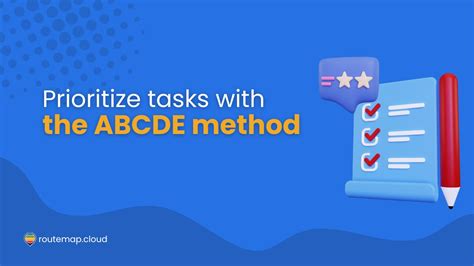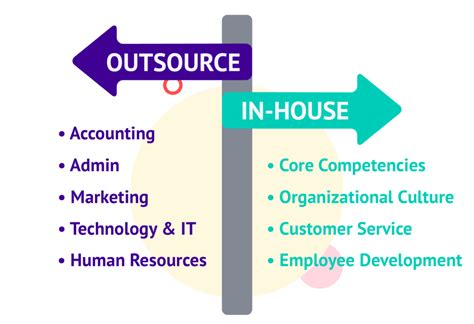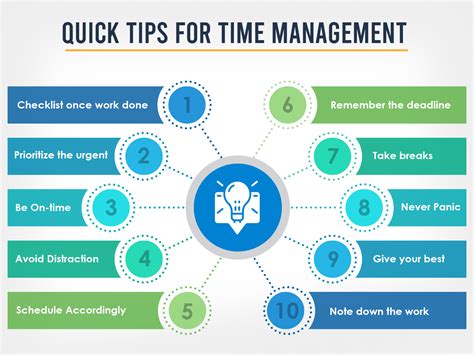In today's fast-paced corporate world, achieving optimal productivity is vital for success. To accomplish this, professionals must efficiently manage their time, making the most of every valuable second. By incorporating a range of well-established techniques, individuals can significantly enhance their effectiveness, effortlessly accomplishing tasks and achieving their goals.
This comprehensive guide offers a wealth of insights into time management methods proven to elevate workplace efficiency. Explore practical strategies to enhance your focus, prioritize tasks, and minimize distractions. Discover the power of effective goal setting, delegation, and resource allocation, enabling you to perform at your peak capacity and surpass expectations.
Unlock the secrets of successful professionals who have mastered the art of time management. Learn how to harness the potential of powerful organizational tools, such as task lists, calendars, and productivity apps, to streamline your workflow. Gain valuable insights into optimizing your work environment, identifying and eliminating productivity drainers, and creating a space that encourages laser-focused concentration.
Prioritize Your Tasks to Maximize Efficiency

When it comes to getting things done and being efficient in the workplace, one crucial factor is prioritizing your tasks effectively. By organizing your workload based on importance and urgency, you can ensure that you are making the most of your time and achieving optimal productivity.
1. Identify Urgent and Important Tasks:
Start by differentiating between tasks that are urgent and tasks that are important. Urgent tasks require immediate attention and have strict deadlines, while important tasks contribute to long-term goals and success. By recognizing the difference between the two, you can prioritize your tasks accordingly.
2. Use Time-Saving Techniques:
Implement time-saving techniques to make the most of your available hours. This can include batch processing similar tasks together, setting deadlines for yourself, and utilizing technology tools such as productivity apps or time-tracking software to streamline your workflow.
3. Consider Your Energy Levels:
Your energy levels throughout the day can impact your productivity. Determine when you are most alert and focused, and schedule your most challenging or critical tasks during these times. Save less demanding tasks for when your energy naturally dips, ensuring you can still make progress without risking burnout.
4. Break tasks into manageable chunks:
Large tasks can sometimes feel overwhelming, leading to procrastination and inefficiency. Break down complex tasks into smaller, more manageable chunks. This not only helps you approach the task with a clearer mindset, but it also allows you to better track progress and stay motivated as you complete each smaller step.
5. Learn to Delegate:
Recognize that you can't do everything on your own. Delegate tasks that can be done by others, freeing up your time to focus on higher-priority assignments. Delegating not only helps you manage your workload more efficiently but also fosters a sense of teamwork and collaboration within your workplace.
6. Regularly Review and Adjust:
Your prioritization strategy should not be set in stone. Regularly review your task list, reassess priorities, and adjust when necessary. As circumstances change or new projects arise, being flexible and adaptable in your prioritization approach will ensure that you continue to maximize your efficiency and productivity.
By prioritizing your tasks effectively, you can optimize your time management and achieve better outcomes in the workplace. Remember to regularly reassess and adjust your priorities as needed, and leverage time-saving techniques to make the most of each workday.
Setting Clear and Attainable Objectives
Establishing clear and achievable goals is a fundamental aspect of enhancing your effectiveness in the professional setting. By defining specific objectives that are both realistic and measurable, you can drive yourself towards success. These goals act as a roadmap, guiding your actions and enabling you to prioritize tasks effectively.
Clarity is key when setting goals. Take the time to clearly define what you want to achieve and why it is important to you and your organization. Clearly articulating your objectives will help you stay focused and motivated, ensuring that your efforts are aligned with your desired outcomes.
When setting objectives, it is important to make sure they are achievable. Consider your available resources, skills, and time constraints. It is crucial to set goals that are within your reach, while still challenging enough to drive growth and development. Breaking down larger goals into smaller, manageable tasks can also help maintain momentum and a sense of accomplishment along the way.
Remember, setting clear and attainable goals provides a sense of direction and purpose, enabling you to make better choices with your time and resources. By mapping out your objectives with precision, you can boost your productivity and accomplish more in the workplace.
Stay Focused by Eliminating Distractions

Enhance your ability to concentrate and maximize your work efficiency by eliminating disruptive elements that can divert your attention and hinder your productivity. Minimizing distractions allows you to maintain focus and achieve your tasks more effectively.
1. Create a Distraction-free Environment: Establish a quiet and organized workspace that is conducive to concentration. Arrange your surroundings in a manner that minimizes visual and auditory disruptions, such as keeping your desk clean and free from clutter, turning off unnecessary notifications on your electronic devices, and using noise-canceling headphones if required.
2. Prioritize and Plan: Set clear goals and establish a structured work schedule. Break down your tasks into manageable segments and allocate specific time slots for each activity. By having a well-defined plan, you can avoid getting sidetracked and maintain a focused approach towards your work.
3. Practice Time Blocking: Allocate uninterrupted blocks of time for specific tasks or projects. During these periods, avoid engaging in non-work related activities and train yourself to concentrate solely on the task at hand. By adopting this technique consistently, you can minimize distractions and be more productive.
4. Utilize Technology Wisely: Leverage productivity tools and applications that help you optimize your workflow. Utilize time management apps, browser extensions that block access to distracting websites, or project management software to streamline your tasks and reduce potential distractions caused by technology.
5. Set Boundaries: Communicate your availability and preferred modes of communication to colleagues, clients, and team members. Establish rules for interruptions, such as setting specific times for meetings and limiting non-urgent requests during your focused work periods. By setting boundaries, you can minimize interruptions and maintain your concentration.
Remember, eliminating distractions is key to staying focused and maximizing your productivity. By proactively managing disruptive elements in your work environment and implementing effective techniques, you can optimize your workflow and accomplish your tasks more efficiently.
Take Regular Breaks to Refresh Your Mind
It is essential to periodically step away from your work and give your mind a much-needed break. Taking regular breaks throughout the day can do wonders for your overall productivity and mental well-being.
- Relax and recharge: By taking breaks, you allow yourself time to relax and recharge. These moments of rest help prevent mental fatigue and allow you to return to your tasks with a refreshed mindset.
- Enhance focus and concentration: Continuous work without breaks can lead to diminishing focus and concentration. Taking short breaks allows your brain to reset, improving your ability to stay focused and attentive.
- Boost creativity and problem-solving: Stepping away from your work environment can stimulate your creativity and enhance problem-solving abilities. Taking a break can provide the mental space needed to think outside the box and come up with innovative solutions.
- Improve mood and reduce stress: Working for long periods without breaks can leave you feeling stressed and overwhelmed. Taking regular breaks can help reduce stress levels and improve your overall mood, leading to a more positive and productive work experience.
- Encourage physical movement: Breaks provide an opportunity to engage in physical movement, which is essential for maintaining overall well-being. Stretching or going for a short walk during your breaks can help improve blood circulation and prevent stiffness or discomfort.
Incorporating regular breaks into your workday is crucial for maintaining productivity and promoting a healthy work-life balance. Remember to schedule short breaks throughout the day and use them as an opportunity to refresh your mind and recharge your energy.
Delegate or Outsource Non-Essential Tasks

Effectively managing your time is crucial for maximizing your efficiency and achieving your goals in the workplace. One strategy that can significantly improve your productivity is delegating or outsourcing non-essential tasks.
| Advantages of Delegating | Advantages of Outsourcing |
| Allows you to focus on important tasks | Access to specialized expertise |
| Reduces workload and stress | Cost-effective solution |
| Promotes collaboration and teamwork | Increases operational efficiency |
| Develops the skills of your team members | Allows flexibility and scalability |
| Increases overall productivity | Enhances focus on core business functions |
Delegating tasks involves assigning responsibilities to individuals within your team who have the necessary skills and expertise. By leveraging the strengths and abilities of your team members, you can distribute workload evenly and ensure that every task is completed efficiently and effectively.
On the other hand, outsourcing non-essential tasks involves contracting external service providers or agencies to handle specific aspects of your business operations. This allows you to tap into the expertise and experience of professionals who specialize in those areas, freeing up your time and resources to focus on core business functions.
Whether you choose to delegate or outsource, it is crucial to assess the importance and complexity of the tasks at hand. Tasks that are non-essential, repetitive, time-consuming, or require specialized knowledge are ideal candidates for delegation or outsourcing.
By delegating or outsourcing non-essential tasks, you can effectively manage your time, improve productivity, and ensure that your focus remains on tasks that directly contribute to the success and growth of your organization.
Utilize Technology to Streamline Your Workflow
In today's fast-paced and digitally-driven world, harnessing the power of technology is crucial for optimizing efficiency and productivity in the workplace. Implementing various technological tools and solutions can help you streamline your workflow, automate repetitive tasks, and enhance collaboration with team members.
One way to utilize technology to your advantage is by leveraging project management software. These platforms offer a centralized hub for organizing projects, assigning tasks, and tracking progress. By effectively utilizing project management software, you can easily communicate project goals, delegate responsibilities, and monitor project timelines. This not only enhances accountability among team members but also eliminates the need for time-consuming meetings and email chains.
Another valuable technology tool is cloud storage and file sharing platforms. Rather than relying on traditional paper documents or cluttered physical storage, utilizing cloud storage allows for seamless accessibility and collaboration on documents and files. With just a few clicks, you can securely store, share, and collaborate on files with team members, regardless of their physical location. This not only eliminates the risk of losing important documents but also ensures that everyone is working with the most up-to-date version.
Automation tools are also indispensable for boosting productivity. Repetitive and time-consuming tasks, such as data entry or email responses, can be automated using specialized software. These tools help free up valuable time, allowing you to focus on more important tasks that require critical thinking and creativity. By automating routine processes, you can significantly increase efficiency and productivity while reducing the likelihood of errors.
Furthermore, communication and collaboration technologies, such as video conferencing and instant messaging platforms, facilitate seamless interaction and real-time collaboration among team members. Virtual meetings can be held without the need for physical presence, saving time and resources. Instant messaging platforms enable quick and efficient communication, allowing for timely responses and rapid decision-making.
In conclusion, embracing technology is essential for streamlining your workflow and maximizing productivity in the modern workplace. Project management software, cloud storage platforms, automation tools, and communication technologies are just a few examples of how technology can revolutionize the way you work. By leveraging these tools effectively, you can eliminate inefficiencies, optimize collaboration, and achieve more in less time.
Develop Effective Time Management Habits

Enhancing your efficiency and maximizing your output can be achieved through the cultivation of efficient time management habits. By implementing effective strategies and routines, individuals can optimize their work process and accomplish tasks more efficiently.
Cultivating effective time management habits involves developing a strong sense of focus and prioritization. It entails identifying the most important tasks and allocating appropriate time and resources to complete them. Additionally, it requires the ability to set clear goals and establish a well-structured plan to achieve them.
Furthermore, a crucial aspect of effective time management habits is the ability to minimize distractions and interruptions. By eliminating unnecessary disruptions, individuals can create an environment conducive to productivity. This involves setting boundaries and utilizing tools and techniques to stay focused on the task at hand.
An essential component of developing effective time management habits is the skill of delegation. By recognizing when to delegate tasks to others, individuals can ensure that responsibilities are distributed effectively and efficiently. Delegation not only frees up time but also allows for a more streamlined and productive workflow.
In addition, the development of effective time management habits requires regular self-assessment and adjustment. Individuals should consistently evaluate their progress and identify areas for improvement. This self-reflection allows for the refinement of strategies and the implementation of new techniques to enhance productivity.
In conclusion, developing effective time management habits is essential for maximizing productivity and achieving success in the workplace. By cultivating strong focus, prioritization, minimizing distractions, embracing delegation, and engaging in self-assessment, individuals can optimize their time and accomplish tasks more efficiently.



